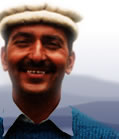 |
 |
||
 |
|||
|
RELATED THEMES economics migration tourism traditional skills OTHER LOCAL THEMES BACKGROUND |
employment and income The narrators represent a variety of occupations within the village: a weaver, a herder, porters, mountaineers and teachers. Of those narrators interviewed outside Shimshal occupations include manager for the Aga Khan Rural Support Programme (AKRSP), bank employee, and teacher trainer. Several narrators were previously employed by the army. A significant number of Shimshali men migrate, either on a seasonal basis - for portering work - or on a more permanent basis for a waged job. Despite significant migration for the majority of Shimshalis, livestock and farming are still important means of livelihood. The tourism industry is attributed as being a major income provider in the form of portering for trekking and mountaineering expeditions - a seasonal earning opportunity which many men in the village exploit. Some narrators are concerned that young men are becoming more inclined to work as porters rather than in farming. Others acknowledge that portering is the only form of cash income available to some, who have no choice other than to do it. Qurban explains, "… as far as the employment or source of income is concerned, a few people have got jobs and the majority of the population has no source of income. Therefore tourism is a major source of income for these people. Those who have jobs meet their daily essential items and needs. But people like me get money from tourists to meet their needs of life. If the tourists didn't come then there is no other means of income to meet [our] daily requirements…" (Pakistan 28). One of the narrators (Pakistan 10) is a weaver by profession; however he reports a decline in demand for his skills: "…I am not happy with the present situation…but it is beyond my control. Now I have started making threads for the people, from yak and goat's hair for making sharma and in this manner I earn money…" Several female narrators briefly mention the cash income they earn through selling handicraft items they have produced. Another narrator (Pakistan 16) describes in detail his profession as a herder. He explains: "…we had not been recruited in the army and we had no other means of [making a] living. So I adopted this (herding), because it is our tradition and it is a source of livelihood for us. We are getting our basic needs of our daily life like meat, butter, cheese, and milk from these animals; otherwise it would be very difficult for us to get these things from outside Shimshal." The absence of a link road has restricted people's opportunities for employment and income. Rajab (Pakistan 23) describes how his attempts to set up a shop failed, largely because of transport difficulties: "…we - two family members - had opened the shop here. Rupees were very strong in those days. I remember that with Rs 1,000 we bought a jeep load of goods from Gilgit. When we reached Gulmit the jeep was out of order. On horseback we transported the goods to Passu and from there almost 7/ 8 people transported them on their backs to Shimshal… We set up our shops with only Rs 1,000. It was profitable too but later on we could not supply goods to Shimshal and it failed… You know after that many [clan-based] societies were formed…they too started businesses but all failed because of transportation and road." He, like many Shimshalis, anticipates that marketing opportunities for potatoes and livestock products will increase with the completion of the link road. quotes about employment and income"…we have a lot of our local products which have no value now, for example, palos (local woven carpet made of yak or goat hair) [but] after the road we would be able to make our own factory in Shimshal. Now we waste most of the goat hair, but in the future we will collect these hairs together and instead of wasting that, we would properly make use of that and sell these sorts of products to generate income. And like this we would sell other locally produced things like local cheese etc. and the amount we get will be used for our children's education, and to fulfil other needs." "Farm work is profitable but demands more labour. Therefore people don't like it; they prefer to carry loads in order to earn more money so that they can get tea and expensive clothes out of this money. I think it is the reason that people prefer trekking with tourists than working in the fields… I think agriculture is more profitable than tourism because tourism is seasonal and is not year round and is also dependent on the socio-political situation of the country. Whereas agriculture is like a fountain that gives a uniform flow all year round. Similarly the income from livestock and employment is uniform throughout the year like agriculture." "After five months stay at Pamir, they return to Shimshal along with their earnings (butter and cheese). In the meantime the people in the village also discharge their responsibilities by watering the fields growing vegetables and potato, weeding the crop fields and also drying vegetables for the winter use. Women carry out all the agricultural works while men go out with tourists to earn [money]. When the crop ripens we harvest the fields and then the threshing is done and the grain is filled in bags and is stored for winter use. We collect our earnings through these few summer months for the rest of the year…" "Whenever I have spare time at home I engage myself in stitching and embroidery works and whenever an angrez (western tourist) visits the village I sell the products to them… I have the view of other women, that instead of wasting their time in leisure, they should do something productive so that it is marketed and the money earned in such a way is invested in the education of their children and should also make some savings." "For many years I have worked for trekkers as a porter… About portering I will say that there is too much suffering and difficulties in working as a porter. You earn by taking difficulties on your life. Here too if you cooperate with the group and guides you will get benefits. In portering I think there are some changes that need to be made. For higher altitude like crossing passes the weight should be reduced. We should work together to ask for more wages when crossing high passes." "When I joined the army, I was not able to speak even a few words of Urdu, because I was not educated. I joined the Pakistan Army in 1972 on the 7th of June. When my relatives heard about my appointment, they were very surprised, because they never heard about these sorts of jobs in their lives." "Then I got admission to an MBA course in Quaid-I-Azam University… I finished university and for my internship, I worked for the AKRSP (Aga Khan Rural Support Program). After that I joined AKRSP... I got opportunities to conduct studies and got training abroad. Those opportunities really boosted me… In the meantime, I helped my brothers and sisters getting education in colleges and universities so I needed a good salary to support them." |
|